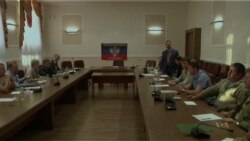President Barack Obama has urged Russian President Vladimir Putin to work closely with Kyiv to implement Ukrainian leader Petro Poroshenko's plan for easing political tensions, starting with a cease-fire declared on Friday.
Obama spoke with Putin by telephone late Monday. The White House said Obama called on Putin to pressure Ukraine's pro-Russia separatists to observe the week-long ceasefire and to halt the flow of weapons across the border from Russia to Ukraine.
Obama told President Putin that "words must be accompanied by actions" and that the U.S. remains prepared to implement additional sanctions, in coordination with its allies and partners, if the situation warrants.
Earlier Monday, a leader of pro-Russian separatists battling Ukrainian troops in eastern Ukraine said the rebels will observe a truce until June 27, to run parallel with Poroshenko's cease-fire.
The announcement came as rebels joined Russian envoys and Ukrainian negotiators in talks aimed at ending the crisis gripping the former Soviet republic. Former president Leonid Kuchma represented Ukraine.
Kuchma told reporters that because of the deal "one of the key problems [blocking negotiations] has been resolved."
Officials say further talks are set for this week.
Russia's Ukraine Ambassador Mikhail Zurabov and Viktor Medvedchuk -- a close associate of Russian President Putin -- also attended the Donetsk talks, along with an envoy from the Organization for Security and Cooperation in Europe (OSCE).
Earlier Monday, the European Union threatened to impose further sanctions on Moscow if it fails to support Poroshenko's peace initiative.
The EU and the United States have so far refrained from imposing economic sanctions more broadly on the Russian economy, choosing instead specific sanctions against key individuals and companies after Russia’s annexation of the Crimean peninsula earlier this year.
Kyiv and Moscow have been locked in a tense standoff since late February, when Ukrainian protesters forced Russian-backed president Viktor Yanukovych to flee the country after months of anti-government demonstrations in Kyiv. The Russian parliament voted to annex Crimea weeks later, over protests from Kyiv and a host of Western governments.
Obama spoke with Putin by telephone late Monday. The White House said Obama called on Putin to pressure Ukraine's pro-Russia separatists to observe the week-long ceasefire and to halt the flow of weapons across the border from Russia to Ukraine.
Obama told President Putin that "words must be accompanied by actions" and that the U.S. remains prepared to implement additional sanctions, in coordination with its allies and partners, if the situation warrants.
Earlier Monday, a leader of pro-Russian separatists battling Ukrainian troops in eastern Ukraine said the rebels will observe a truce until June 27, to run parallel with Poroshenko's cease-fire.
The announcement came as rebels joined Russian envoys and Ukrainian negotiators in talks aimed at ending the crisis gripping the former Soviet republic. Former president Leonid Kuchma represented Ukraine.
Kuchma told reporters that because of the deal "one of the key problems [blocking negotiations] has been resolved."
Officials say further talks are set for this week.
Russia's Ukraine Ambassador Mikhail Zurabov and Viktor Medvedchuk -- a close associate of Russian President Putin -- also attended the Donetsk talks, along with an envoy from the Organization for Security and Cooperation in Europe (OSCE).
Earlier Monday, the European Union threatened to impose further sanctions on Moscow if it fails to support Poroshenko's peace initiative.
The EU and the United States have so far refrained from imposing economic sanctions more broadly on the Russian economy, choosing instead specific sanctions against key individuals and companies after Russia’s annexation of the Crimean peninsula earlier this year.
Kyiv and Moscow have been locked in a tense standoff since late February, when Ukrainian protesters forced Russian-backed president Viktor Yanukovych to flee the country after months of anti-government demonstrations in Kyiv. The Russian parliament voted to annex Crimea weeks later, over protests from Kyiv and a host of Western governments.






